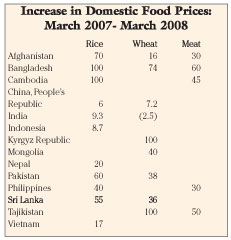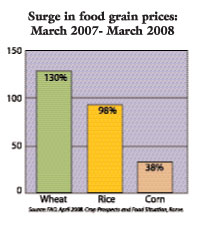ADB pledges support for Asia’s hardest-hit countries
By Lalin Fernandopulle
lalin @sundayobserver.lk
The Asian Development Bank (ADB) will allocate US $ 500 million as
immediate budgetary support to tackle rising food costs in the
Asia-Pacific region and pledged to double the lending to US$ 2 billion
for agriculture in 2009.
  The ADB is planning to lend US$ 1 billion this year to the
agriculture and natural sector and will double the lending next year as
support for Asia’s hardest-hit countries. The ADB is planning to lend US$ 1 billion this year to the
agriculture and natural sector and will double the lending next year as
support for Asia’s hardest-hit countries.
The assistance is to help governments alleviate the fiscal burden and
bring food to the table of the most vulnerable and needy. The resources
could be used to import food, grains and agricultural inputs such as
fertiliser.
When contacted ADB Country Director Richard Vokes said the ADB will
continue to monitor the situation in Sri Lanka in cooperation with the
government and other development partners.
“While the present crisis has refocused attention on food security,
it is also important that the costs and benefits of various policies and
investment options to tackle the crisis are carefully analysed to ensure
that they contribute in a sustainable way to develop the sector and the
country,” Vokes said.
Meanwhile, the ADB report on Soaring Food Prices-Response to the
Crisis stated that the rising food prices threaten to reverse the gains
in poverty reduction in the Asia and Pacific region, undermining the
global fight against poverty.
The report said that the situation demands an early response from
governments with targeted programs that provide direct assistance to the
poorest, the most vulnerable and policy measures that support open trade
and distribution of basic commodities across the region.
The report said that ADB’s short-term assistance include targeted
interventions to protect the food entitlements of the most vulnerable
groups and income and livelihood programs for the poor to mitigate the
impact of the crisis.
In its long-term assistance to the agricultural and natural resources
sector, the bank seeks to enhance productivity, improve market access
and deepen reforms.
Soaring food prices have eroded the purchasing power of over a
billion poor in Asia, increasing their food deprivation.
The food crisis has stoked inflation and reduced fiscal space in many
countries, increasing the risk of high inflation, interest rates and
slow down in economic growth.
“If the food prices continue to rise the Millennium Development Goals
to be attained by 2015 will be jeopardised,” the report states.
Although food grain prices declined during the 1990’s, a reversal
took place in 2000 and therefore prices have been rising with a sharp
upturn from mid 2007.
During the year wheat export prices increased by 130 per cent, rice
by 98 per cent and maize by 38 per cent.
Domestic prices doubled in Bangladesh and Cambodia and increased by
70 per cent in Afghanistan, 55 per cent in Sri Lanka and 40 per cent in
the Philippines.
The adverse weather conditions, rise in fuel prices, increase in
consumption in India and China and the use of grains for the manufacture
of bio-fuel are reasons cited by experts for the sharp rise in world
food prices. |
